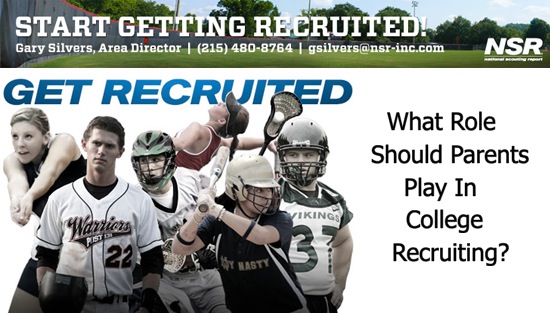- Log in to post comments
The following article is sponsored by National Scouting Report. Visit NSR’s web site at http://www.nsr-inc.com/

WHAT ROLE SHOULD PARENTS PLAY IN COLLEGE RECRUITING?
By Gary Silvers
Your child tells you he/she wants to play college athletics. Your eyes light up and a huge smile crosses your face. You are so proud of him/her.
You desperately want to help your child get recruited and perhaps receive a scholarship. You tell him/her you will do everything possible to help. In fact, you offer to lead the charge.
But, before you get carried away, here are two words of advice: Back off!
The last thing a college coach wants is an over-involved parent of a prospect. Make sure you aren’t perceived as one. If you are, you may do more harm than good. You may even steer a coach in another direction.
“If a parent drives a high school coach crazy, I usually hear about it first from the high school coach,” said Gerry Matthews, longtime men’s basketball coach at NCAA Division III Stockton University in South Jersey. “I have on occasion avoided some prospects whose parents were too tough to handle.”
Rather than take charge of the recruiting process, parents should take a team approach. Tell your child you would like to be his/her partner or personal assistant. Let your child lead the way. Recruiting is his/her journey, not yours. It’s important that your child take ownership of the process and, ultimately, the final decision.
What can parents do to help?
Here’s a to-do and not-to-do list for parents of college prospects:
TO-DO LIST
- Organize personal files: high school transcript, standardized test scores, statistics, honors and achievements, extra-curricular activities, community service, etc.
- Help your child develop his/her academic-athletic resume.
- Videotape or hire someone to video your child’s games.
- Help him/her finalize a cover letter or personal message to college coaches. Don’t write it. Edit it.
- Assist your child in selecting at least 50 colleges that meet his/her athletic and academic criteria.
- Help him/her fill out and submit college questionnaires.
- Prompt your child to answer all emails and letters from college coaches, establishing relationships with them.
- Assist your child in planning college visits and accompany him/her to college campuses.
- Help him/her compile a list of questions to ask coaches during visits.
- Ask important questions during visits, but don’t dominate the conversation.
- Research scholarship and financial aid opportunities and submit applications in a timely manner.
NOT-TO-DO-LIST
- Don’t tell your child which colleges he/she should pursue. Review his/her list and make possible suggestions.
- Avoid responding to emails and letters from college coaches, but remind your child to respond.
- Don’t stay on the telephone when coaches call your child; coaches want to talk to your child, not you.
- Avoid responding to telephone messages from college coaches, but remind your child to respond.
- Don’t email or call college coaches on your own. Your child, not you, needs to develop relationships with coaches.
- Avoid answering questions for your child when meeting with coaches.
- Don’t exaggerate your child’s athletic and academic ability to coaches.
- Avoid being perceived by coaches as too involved. If they think you’re too involved during the recruiting process, image what they might think if they had to deal with you for four or five years?
- Don’t make the final college decision for your child. Discuss his/her final choices – athletically, academically and financially – but let him/her make the ultimate choice.
“In the end, it’s up to the students,” said Bill Saar, veteran softball coach at Division III Neumann University in suburban Philadelphia. “They need to be happy with their final decision. They’re the ones who need to decide if the school, the program and the coach are right for them.”
National Scouting Report, the nation’s oldest and largest high school scouting and college recruiting organization, helps qualified high school prospects (freshmen, sophomores, juniors and seniors) connect with college coaches. More than 95 percent of NSR’s qualified prospects receive scholarship offers. For a FREE in-home consultation, contact Area Director Gary Silvers at (215) 480-8764 or gsilvers@nsr-inc.com.

